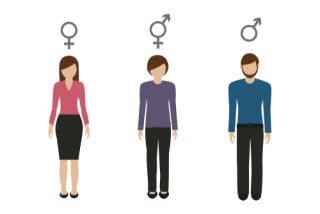Sex
Beyond Freud: Acquiring New Body Parts in Virtual Reality
Technology could transform the sexual experience.
Posted May 28, 2023 Reviewed by Jessica Schrader
Key points
- Avatars in VR are not limited by the biological constraints of the human body.
- In one study, participants reported they could move and even feel an extra arm fabricated in VR as their own.
- As technology advances, avatars may be endowed with multiple and/or unique sex organs.
I am regularly astounded by technological advances. It’s not like every few weeks I read something that makes my brain explode—it’s more like every day. As a sex therapist, I inevitably consider the impact of these developments on sex and intimacy. The research I’m describing here, which explores people's ability to embody new limbs in virtual reality, is a perfect example.

In one study, research subjects were able to embody the experience of a robotic arm fabricated in virtual reality (Arai et al., 2022). The researchers enabled subjects to control their new appendage with their toes. Once the brain understood that it controlled the third arm, despite it being a rather unusual route of control, the research participants experienced it as their own. In fact, participants endorsed statements such as “I felt as if the virtual robot limbs/arms were my limbs/arms,” and “It felt like I could control the virtual robot arms as if they were my own arms.”
This begs the question: how is it possible that despite knowing they didn’t have three arms, participants felt as if this third arm was theirs? The researchers suggest that the brain’s natural neuroplasticity allows for such perceptual shifts. Perhaps this deception is of evolutionary design—for hundreds of thousands of years, if we were able to control a body part, that meant it was ours. As a result, our unconscious mind may have no reasonable alternative interpretation for this mystifying experience than to understand an ability to move a limb as implying that we own the limb. Hence, even though our conscious mind knows we are experiencing virtual reality and don’t have three arms, our felt experience of that third arm is convincing. This research is being conducted in an effort to assist folks who have lost limbs to ultimately embody robotic limbs as their own. As a sex therapist, I wonder what relevance this research will have on people’s sexual experience.
It seems inevitable that people will choose to virtually experience additional, and/or different, genitals. Relatedly, experimenting with different sexual bodies, and thus different sex practices, can conceivably impact people’s emotional experience of sex. The plot thickens when you consider the research suggesting that those who spend more time with their virtual avatars eventually meld with them to a degree, and thus embody the emotional nuances of their avatars in real life (Praetorius & Gorlich, 2020). In this way, our real-life identities can literally merge with our fantasy selves. For example, a confident avatar can help people feel more confident in the real world. It’s called the Proteus effect, as confirmed by a recent meta-analysis (Ratan et al., 2020). Extrapolating again to an example of experimenting with sexual identities, more empowered avatar sex can conceivably impact a person’s experience of personal power in the real world.
Further, researchers suggest that these perceptual shifts have neurophysiological correlates. For example, memories formed during VR experiences have been shown to be stored neurologically similarly to real-life memories (Kisker et al., 2021; Schone et al., 2019). Thus, if it happens to you in a virtual world, the memory is stored in your brain similarly to if it happened in real life. Fascinating. It seems likely, then—even probable—that the real-life perception of gender and sexual identity could increasingly become a manifestation of the experiences we create in VR. This virtual reinvention of your sexual identity will likely only be limited by your creativity and adventurousness.
We are only just beginning to understand how the experience of being human will be shaped by advancing technology. Human intimacy will likely be impacted in a variety of ways as we acquire more control over our virtual sexual selves. The Proteus effect suggests that our intimate experiences in VR may influence the way we give and receive love in real life. Human connection is now on a transformational path filled with mystery. It’s not about Freud’s notion of penis envy anymore. Changing your sexual body, and thus your sexual experience, may increasingly simply become a matter of avatar design.
References
Arai, K., Saito, H., Fukuoka, M., Ueda, S., Sugimoto, M., Kitazaki, M. & Inami, M. (2022). Embodiment of supernumerary robotic limbs in virtual reality. Scientific Reports, 12, 9769. https://doi.org/10.1038/s41598-022-13981-w
Kisker, J., Gruber, T. & Schöne, B. (2021). Virtual reality experiences promote autobiographical retrieval mechanisms: Electrophysiological correlates of laboratory and virtual experiences. Psychological Research, 85. https://doi.org/10.1007/s00426-020-01417-x
Ratan, R., Beyea, D., Li, B.J. & Graciano, L. (2020). Avatar characteristics induce users’ behavioral conformity with small-to-medium effect sizes: a meta-analysis of the proteus effect. Media Psychology, 23(5), 651-675.
Praetorius, A.S. & Gorlich, D. (2020). How avatars influence behavior: A review on the proteus effect in virtual environments and video games. FDG '20: Proceedings of the 15th International Conference on the Foundations of Digital Games. Article No.: 49, 1-9. https://doi.org/10.1145/3402942.3403019
Schöne, B., Wessels, M. & Gruber, T. (2019). Experiences in Virtual Reality: a Window to Autobiographical Memory. Current Psychology, 38, 715–719. https://doi.org/10.1007/s12144-017-9648-y


